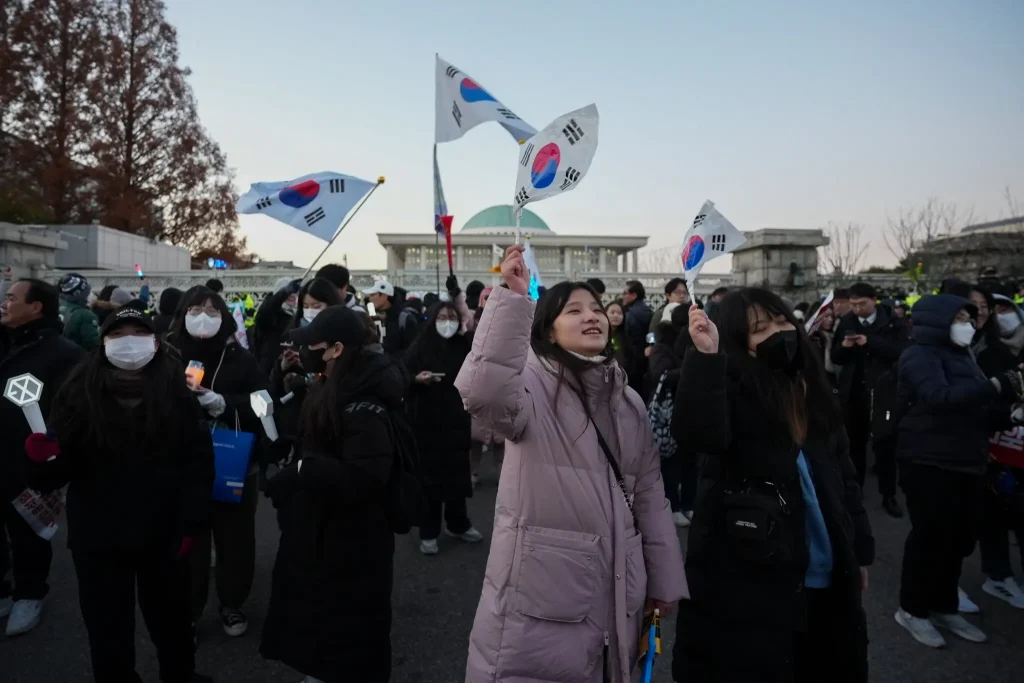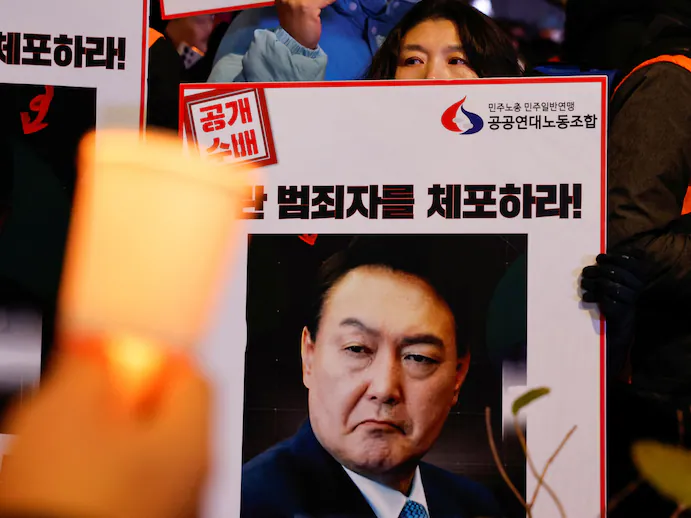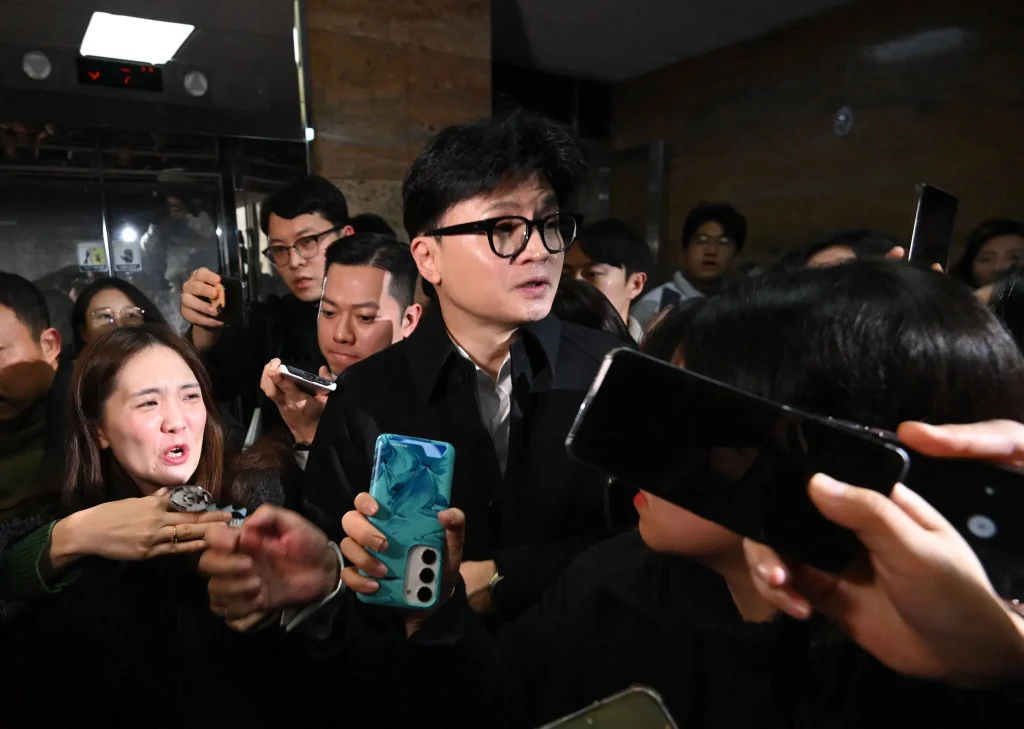After Impeachment, South Korea Is Left With No Elected Leader

South Korea is grappling with a political crisis after the impeachment of its president, leaving the country without an elected leader for the first time in modern history. The impeachment, which has shocked the nation and the international community, has plunged the country into political uncertainty, raising questions about governance and the stability of South Korea’s democratic system.
The crisis began when President Yoon Suk-yeol faced growing pressure from both opposition lawmakers and segments of the public over his handling of several domestic and international issues. Despite being in office for less than two years, his approval ratings plummeted due to his controversial policies and perceived failures in managing economic difficulties, social unrest, and strained relations with neighboring countries. The impeachment, which was triggered by accusations of abuse of power and misconduct, passed with a significant majority in the National Assembly.
The Impeachment Process
The impeachment process in South Korea was initiated after mounting allegations of corruption, mismanagement, and overreach by the president. Critics accused Yoon of manipulating government agencies to suppress dissent, mismanaging public funds, and failing to properly address the country’s growing economic issues. The National Assembly, which is controlled by opposition parties, took the unprecedented step of voting to impeach the president, citing breaches of the constitution and misconduct in office.
South Korean law stipulates that an impeachment vote requires a two-thirds majority in the National Assembly, and the motion was approved with overwhelming support from lawmakers. Following the impeachment, Yoon’s powers were suspended, and the country was left without a sitting president.
The Constitutional Court now has six months to review the impeachment and decide whether to uphold or overturn the decision. If the court confirms the impeachment, South Korea will enter a period of vacancy in its leadership, with elections to be held to select a new president. However, if the court decides to reverse the decision, Yoon could return to office.
Political Uncertainty
South Korea’s current political situation is marked by deep uncertainty. With the president suspended and no clear leader at the helm, the country faces a leadership vacuum that is causing concern among citizens and the international community. The National Assembly is expected to appoint an acting president from among the top officials to take over temporarily while the legal process unfolds.
This situation has prompted widespread debate about the future of South Korea’s political landscape. Many are questioning the effectiveness of the political system, given that an impeachment of such magnitude could occur so early in a president’s term. The South Korean constitution does allow for the impeachment of a sitting president, but it is an extremely rare and dramatic step that can lead to serious political and social consequences.
Public Reaction and Protests
The impeachment has sparked intense debate and protests across South Korea. Supporters of the impeachment argue that it is a necessary step to uphold the rule of law and ensure that no leader is above accountability. They believe that the president’s actions warranted such a move and that it is crucial for South Korea’s democracy to send a clear message about the importance of integrity and transparency in government.
On the other hand, Yoon’s supporters view the impeachment as politically motivated and an attempt by opposition parties to remove him from office. Many of them believe that the accusations against him were exaggerated or fabricated and that the president’s policies, particularly on economic reform and foreign relations, were in the country’s best interest. These supporters have taken to the streets in protests, demanding that the impeachment be overturned and that Yoon be reinstated.
The situation has divided the nation, with many South Koreans expressing frustration with the country’s political system, which has become increasingly polarized in recent years. Citizens are concerned about the lack of political stability and the potential for further disruptions to governance in the coming months.
Impact on Governance and International Relations
The political crisis in South Korea has raised concerns about the functioning of the government and its ability to make critical decisions during this period of uncertainty. With no elected leader at the helm, key policy decisions are on hold, and government agencies are struggling to operate without clear direction. Economic decisions, in particular, are being delayed, as the country faces challenges such as inflation, rising unemployment, and ongoing trade tensions with neighboring countries.
Additionally, South Korea’s international relations are in a state of flux. The country’s foreign policy, particularly in relation to North Korea, the United States, and China, is crucial in maintaining regional stability. With the country’s leadership in limbo, foreign governments are closely watching the situation, unsure of how South Korea will navigate these complex issues in the absence of a stable president.
The crisis also has implications for South Korea’s role in global geopolitics. As a key ally of the United States and a major player in the Asia-Pacific region, the leadership vacuum in South Korea could undermine the country’s ability to engage effectively with global challenges, such as the rise of China, North Korean provocations, and regional security issues.
Looking ahead, South Korea faces a period of political instability that could reshape the country’s political landscape. The Constitutional Court’s decision on the impeachment will be crucial in determining the country’s next steps. If the impeachment is upheld, South Korea will hold a presidential election, which will likely be contentious and heavily influenced by the public’s divided opinion on the impeachment.
Regardless of the outcome, the political crisis has highlighted the fragility of South Korea’s political system and the deep divisions within the country. It also serves as a reminder of the importance of leadership accountability and the challenges that come with balancing political power, public trust, and governance.
In the meantime, South Korea’s political parties will be forced to navigate this crisis carefully, seeking to maintain stability while addressing the underlying issues that led to the impeachment in the first place. The road ahead will require careful negotiation and compromise to restore faith in the country’s political institutions and ensure a smooth transition to new leadership.






